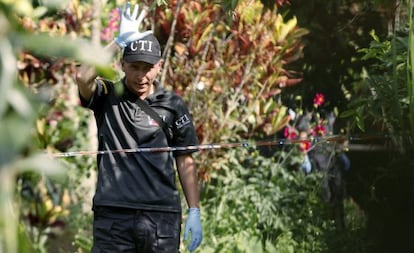FARC announces it will free soldier captured just hours before ceasefire
Serviceman was abducted during battle ahead of unilateral suspension of active hostilities

The Revolutionary Armed Forces of Colombia (FARC) guerrilla group has announced that it will free a soldier it captured in north Cauca province (southern Colombia) just a few hours before it declared an indefinite unilateral ceasefire on December 20, the first in its 50 years of armed conflict. The soldier will be released in the next few days, according to a statement released by the FARC.
“Today we initiated special humanitarian protocols for the liberation of a soldier,” the text reads. The serviceman, the statement says, suffered “light” injuries during a firefight that took place in the early hours of Friday, December 19. The 25-year-old soldier, Carlos Becerra, was captured by rebels during the ambush of a Colombian military convoy, which left five soldiers dead and several others wounded.
Becerra was thought to be missing until the Colombian army confirmed his abduction, demanded his immediate liberation and began a search operation for him. The other soldiers who died in the ambush were protecting road construction equipment. According to forensic officials, they suffered injuries from the detonation of explosives and then were shot at close range.
The other soldiers suffered injuries from the detonation of explosives and then were shot at close range
Hours before the announcement, the rebel army had published another statement to confirm its indefinite unilateral ceasefire, a gesture Colombian President Juan Manuel Santos called a first step toward scaling back the conflict. Many Colombians have expressed their dismay at the fact that their government has been negotiating a peace process in Havana with FARC representatives, while the war rages on back home.
The government of President Santos has opted to continue to hunt down rebels as the peace talks progress, given that in the past the FARC has taken advantage of ceasefires to strengthen its army.
For FARC leaders, the ceasefire is not just a gesture toward the victims of the conflict, but also “a gesture of humanity” toward soldiers and police officers. “If we really want the end of the conflict as we stated in the Agenda [for peace negotiations], there is no sense in there being more deaths, more people injured or affected by it,” the group said in a previous announcement.
The government of President Santos has opted to continue to hunt down rebels as the peace talks progress
The FARC have also called for an international organization to verify the ceasefire, although President Santos has ruled out that possibility given that, at the start of negotiations two years ago, both parties agreed to verify “the bilateral and definitive ceasefire” at the end of the peace process.
But the guerrilla group is insisting it is necessary to verify their unilateral ceasefire because, they say, the “enemies of national reconciliation came out to disqualify our conduct” during past ceasefires at Christmas time and during presidential elections. Independent organizations monitoring the conflict in Colombia generally agree that the FARC did comply with the terms of previous truces.
The FARC is also urging Santos to halt all military operations, warning that they will break the ceasefire if rebel troops are attacked, a situation that may emerge given that the Colombian head of state has said the armed forces will continue to reinforce the law.
In their statement, rebel leaders say they want a truce on both sides: “We are optimistic that good sense and reason will prevail...You [soldiers and police] and us who know the reality of the conflict know that no one wants to be the last casualty of a war that is coming to an end.”
Translation: Dyane Jean François
Tu suscripción se está usando en otro dispositivo
¿Quieres añadir otro usuario a tu suscripción?
Si continúas leyendo en este dispositivo, no se podrá leer en el otro.
FlechaTu suscripción se está usando en otro dispositivo y solo puedes acceder a EL PAÍS desde un dispositivo a la vez.
Si quieres compartir tu cuenta, cambia tu suscripción a la modalidad Premium, así podrás añadir otro usuario. Cada uno accederá con su propia cuenta de email, lo que os permitirá personalizar vuestra experiencia en EL PAÍS.
¿Tienes una suscripción de empresa? Accede aquí para contratar más cuentas.
En el caso de no saber quién está usando tu cuenta, te recomendamos cambiar tu contraseña aquí.
Si decides continuar compartiendo tu cuenta, este mensaje se mostrará en tu dispositivo y en el de la otra persona que está usando tu cuenta de forma indefinida, afectando a tu experiencia de lectura. Puedes consultar aquí los términos y condiciones de la suscripción digital.








































